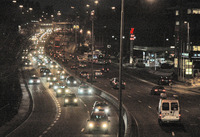
|
| The fifth report in the OPTIC project consists of an empirical exploration of barriers and success factors in four cases of policy packaging. Photo: Are Wormnes. |
Achieving a sustainable transport system is a major challenge in today’s society. A key issue for current transport policy making is thus to identify policies that are effective in reaching targets, efficient with regard to the economy, politically acceptable and practically feasible. Single policy measures often need to be combined into packages.
The fifth report in the OPTIC project consists of an empirical exploration of barriers and success factors in four cases of policy packaging: Urban Congestion Charging (with examples from London, Stockholm and Manchester), National Heavy Vehicle Fees (with examples from Switzerland and Germany), Aviation in the European Emissions Trading System (EU level) and The EU’s First Railway package (with examples from the implementation process in Denmark and Sweden)
From these cases more general strategies to manage barriers in policy formation and implementation are outlined. The main strategies identified are:
• Combining sticks and carrots
• Expanding the policy scope and developing flexibility in negotiations
• Trials – a way to legitimacy and acceptance
• Communicating benefits clearly
• Using good examples
• Preparing for windows of opportunities
• Organisational responsibility and set-up
• Applying state funding to instigate municipal investments
• Selection of established or innovative technical solutions
The outcome of a policy process is always dependent on political will and leadership, the qualities of the people involved in the process and how they manage to respond to unpredictable events. Nevertheless, a key conclusion of this study is that conscious application of the strategies identified may contribute significantly to successful policy formation and implementation.
